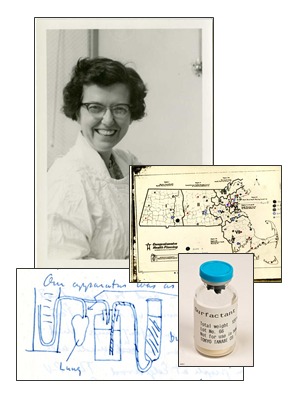Mary Ellen Avery: Highlights from Her Collection

The Mary Ellen Avery Papers are one of the founding collections of the Archives for Women in Medicine. This exhibit shares just a small selection of letters, photographs, diaries, and other items which help to document Avery’s pioneering career and contributions to pediatrics. Avery is known for her 1959 discovery of the cause of respiratory distress syndrome (RDS) in premature infants: the lack of lung surfactant, a foamy fluid which creates surface tension and allows the lungs to inflate. This discovery led to the development of a treatment for RDS in newborns. By 2005, this treatment had decreased the number of infant deaths from RDS in the U.S. to 860 annually, down from almost 10,000 a year in 1970.
Avery was one who meticulously documented, often scribbling her personal reflections on the backs of meeting agendas or napkins, or typing up her own accounts of various events just for, in her words: “the historical record.” Over the years she built a rich collection of papers and records that document not only her significant achievements, but also the warmth, humor, and courage that made her an inspiration and a role model to many.
For more information about the collection, view the Finding Aid to the Mary Ellen Avery Papers.
Share Your Story
Submit your own stories or pictures related to Mary Ellen Avery to our Visitor Comments section, or send us feedback or questions about the exhibit. View other's stories here.
Credits
This online exhibit was inspired by a physical exhibit created in conjunction with a special Women-in-Medicine-Month Grand Rounds held at Children's Hospital, Boston, in September 2010. The original exhibit was co-curated by the Archives for Women in Medicine and the Children's Hospital Archives. Presented here are items from the Mary Ellen Avery Papers and the Warren Anatomical Museum, both part of the Countway Library of Medicine.
